|
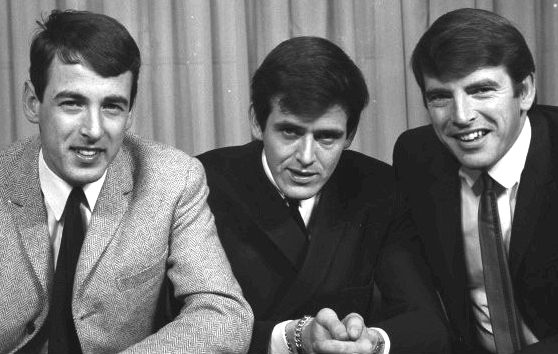
The
Bachelors, Irish pop group, Declan Cluskey, John Stokes and Conleth Cluskey
The Bachelors are a popular music group, originating from Dublin,
Ireland - a great bunch of guys that were extremely popular.
The founding members of the group were Conleth (Con) Cluskey (born 18 November 1941), Declan (Dec) Cluskey (born 23 December 1942), and John Stokes (Sean James Stokes) (born 13 August 1940). In 1957 they formed their first band together: "The Harmonichords" (also seen as "The Harmony Chords"), a classically styled instrumental harmonica-act.
As The Harmonichords, they appeared on Hughie Green's 'Opportunity Knocks' on Radio Luxembourg and on the 'Ed Sullivan' TV Show St. Patrick's Day Special (filmed in Dublin, broadcast 15 March 1959), where they played "Danny Boy." They also played background music plus featured pieces in a 25-week radio comedy series called 'Odd Noises' on Radio …ireann featuring Eamonn Andrews. They changed their name to "The Bachelors" in 1960 at the suggestion of Dick Rowe, A&R at Decca Records, who reportedly recommended the name "because thatís the kind of boy a girl likes."
During the 1960s, they had many successful songs in music charts in Europe Australia, South Africa,
South America, parts of the
USSR, and the United States. Some of the most successful were "I Believe" a No. 1 hit in America for several weeks in 1961, "Charmaine" (1963); "Diane", "I Believe" (re-released in 1964, and re-charting in America at No. 33), "Ramona" and "I Wouldn't Trade You for the World" (1964); "Marie" (written by Irving Berlin) and "In the Chapel in the Moonlight" (1965). In 1965 they had the 'most played juke box track' with "The Stars Will Remember" from a film they made with then-current DJ Sam Costa. Their last big hit in the UK was a cover of the Paul Simon song "The
Sound of Silence" which reached No. 3 in April 1966.
Live work carried them into the 1970s with record breaking theatre season shows, but after a successful start to the decade with the album World of the Bachelors hitting the top 5, the band became less and less dominant in the changing music industry. They remained successful recording artists and moved to the Pye label, which contracted easy listening stars like Frankie Vaughan and Max Bygraves. Despite their last chart single being in 1967, they continued to play the cabaret circuit, still maintaining the original line-up until 1984, when there was "a messy split" between the Cluskey brothers and Stokes.
Easy lads, bygones be bygones.
Following the split, the Cluskey brothers appeared as "The New Bachelors" and Stokes as "Stokes & Coe", Stokes allegedly also then appeared as "The New Bachelors" and the Cluskeys now perform as "Con & Dec, The Bachelors".
In 2008 a compilation CD, "I Believe - The Very Best of The Bachelors", featuring the 1960s hits together with two new songs recorded by Con and Dec Cluskey, was released through Universal who had acquired the Decca
catalogue (available in the US as an import from Uni Classics Jazz UK), reached #7 in the UK
Radio One album chart 27 July - 2 Aug 2008. Con and Dec Cluskey appeared on TV and radio to promote the album.
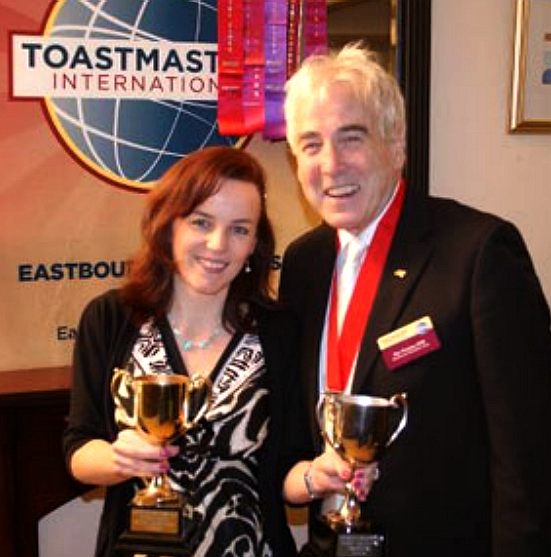
Claire
Carpenter receives awards from Dec Cluskey Toastmasters,
Eastbourne
FILM & TELEVISION
Throughout the 1960s the Bachelors racked up hit singles and albums and made guest appearances on all the then current TV shows, and appeared in two Royal Variety
TV shows. In 1963 they starred in It's All Over Town with Frankie Vaughan and The Springfields. In 1964 they starred alongside Bob Hope in the TV show Sunday Night at the London Palladium, then hosted by Bruce Forsyth: this episode, according to Paul Gambaccini, achieved the largest viewing audience ever for this very popular show.
The Bachelors appeared in a film in 1964 called 'Just for You', with Billy Fury. In 1965 they made I've Gotta Horse and in 1971 they starred in a TV situation comedy series called Under and Over playing three Irish navvies working on the
London Underground. Six episodes were broadcast on
BBC One.
The group began 1970 by appearing on the BBC's highly-rated review of the sixties' music scene Pop Go The Sixties performing "Charmaine" and "Diane" live on the show, which was broadcast on BBC1 on 1 January 1970.
SONGS
The Bachelors' version of "Charmaine", with its descending melody that had already made it an evergreen, jogs along to a country guitar strum and a sprinkling of piano licks. Dick Rowe chose American Shel Talmy as record producer, who went on to produce some of The Kinks' classic rock hits. Another 1927 movie theme song, "Diane", penned by the same songwriters as "Charmaine", Erno Rapee and Lew Pollack, and arranged in the same Nashville-like manner, but produced by Michael Barclay, was released in 1964 and gave the group their first Number one in the UK Singles Chart, as well as an American breakthrough at number ten.
It is curious to note that four of their hit songs were taken from 1920s movies. Before The Bachelors, Jim Reeves had also covered the same four songs, "Charmaine", "Diane", "Ramona" and "Marie," in the 1950s.
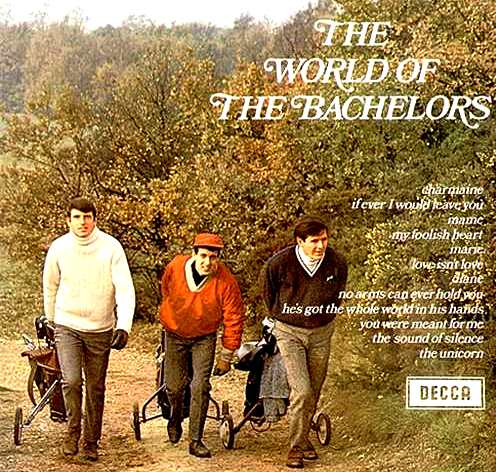
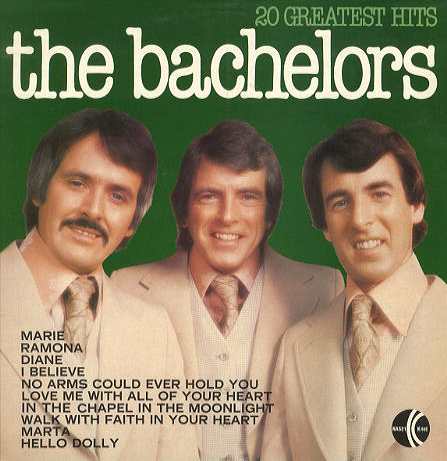
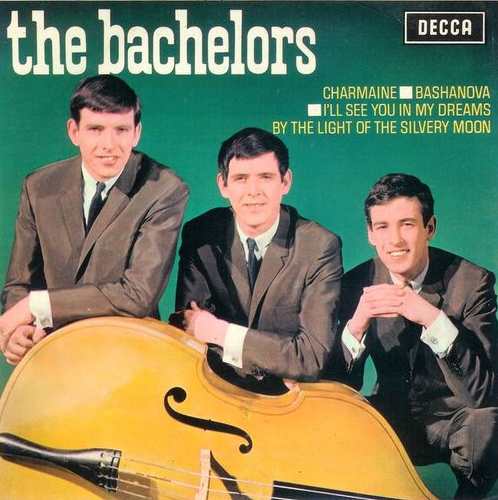
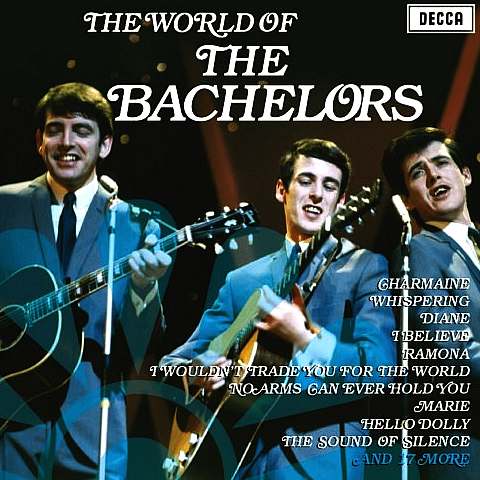
The
cover art, was not that inspiring, but then it went with the times.
DISCOGRAPHY
MUSIC
INDEX A - Z
Recording
artists: All monies raised from this site is to be used to send a message to world leaders that there is an alternative to
Petrol Wars, Nuclear
Power, Poverty
and Famine.
LINKS
http://www.allmusic.com/artist/the-bachelors
http://www.allmusic.com/artist/the-bachelors-mn0000038182
http://www.the-bachelors.com/
http://en.wikipedia.org/wiki/The_Bachelors
http://www.thebachelors.co.uk/
Kulo
Luna $billion dollar whale
When
a pirate whaler kills a small humpback whale, her giant friend sinks the
pirate ship to avenge the death, but is itself wounded. The pirates put
a price on the whale's head, but an adventurer in an advanced solar
powered boat races to beat the pirates and save the wounded animal.

A
heartwarming action adventure: Pirate whalers V Conservationists, with
an environmental message and a $Billion dollars riding on the winner.
For release as an e-book in 2013 with hopes for a film in 2015 with
a provisional budget of £ 80m
including risk share, TBA
|





